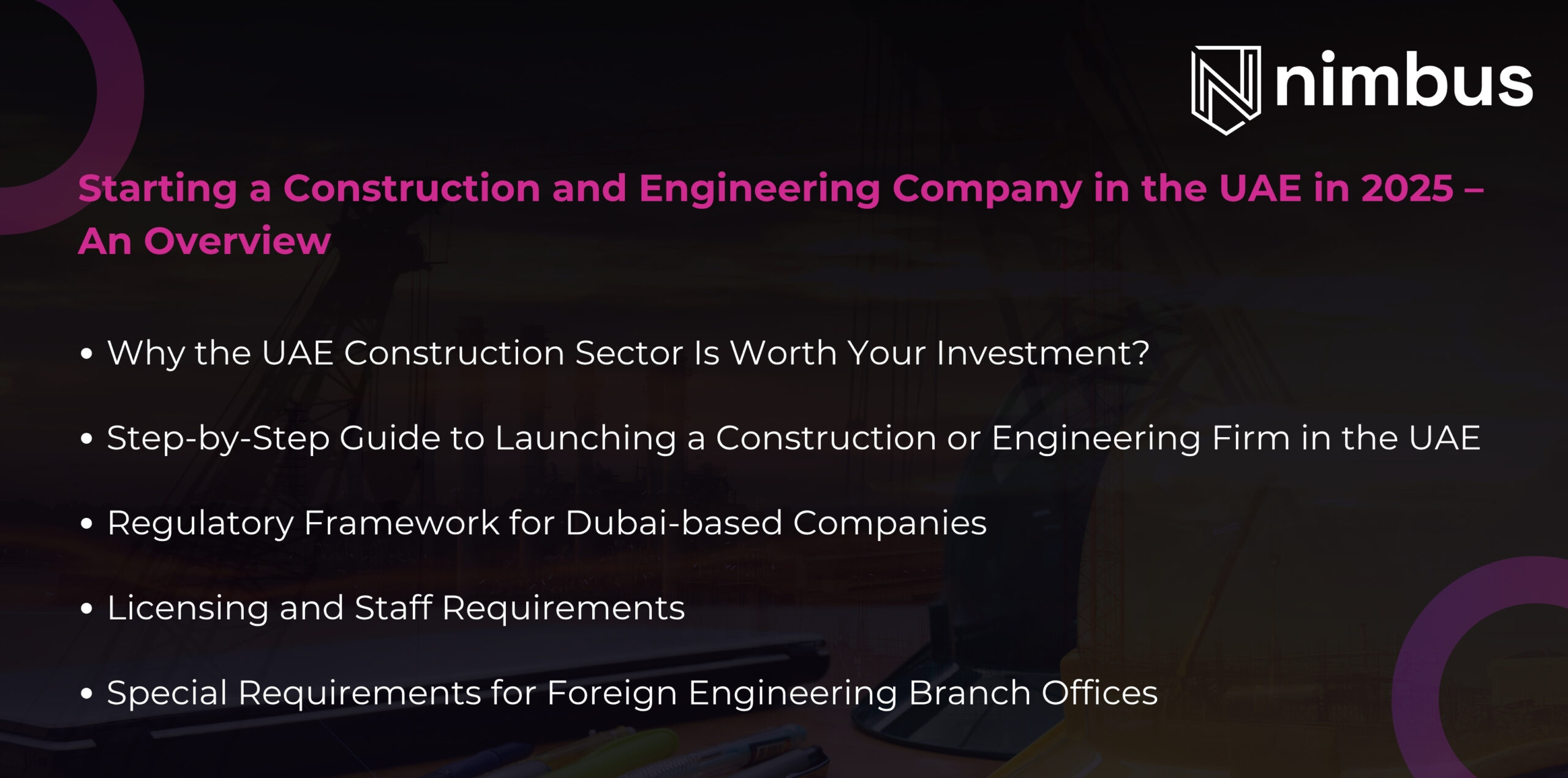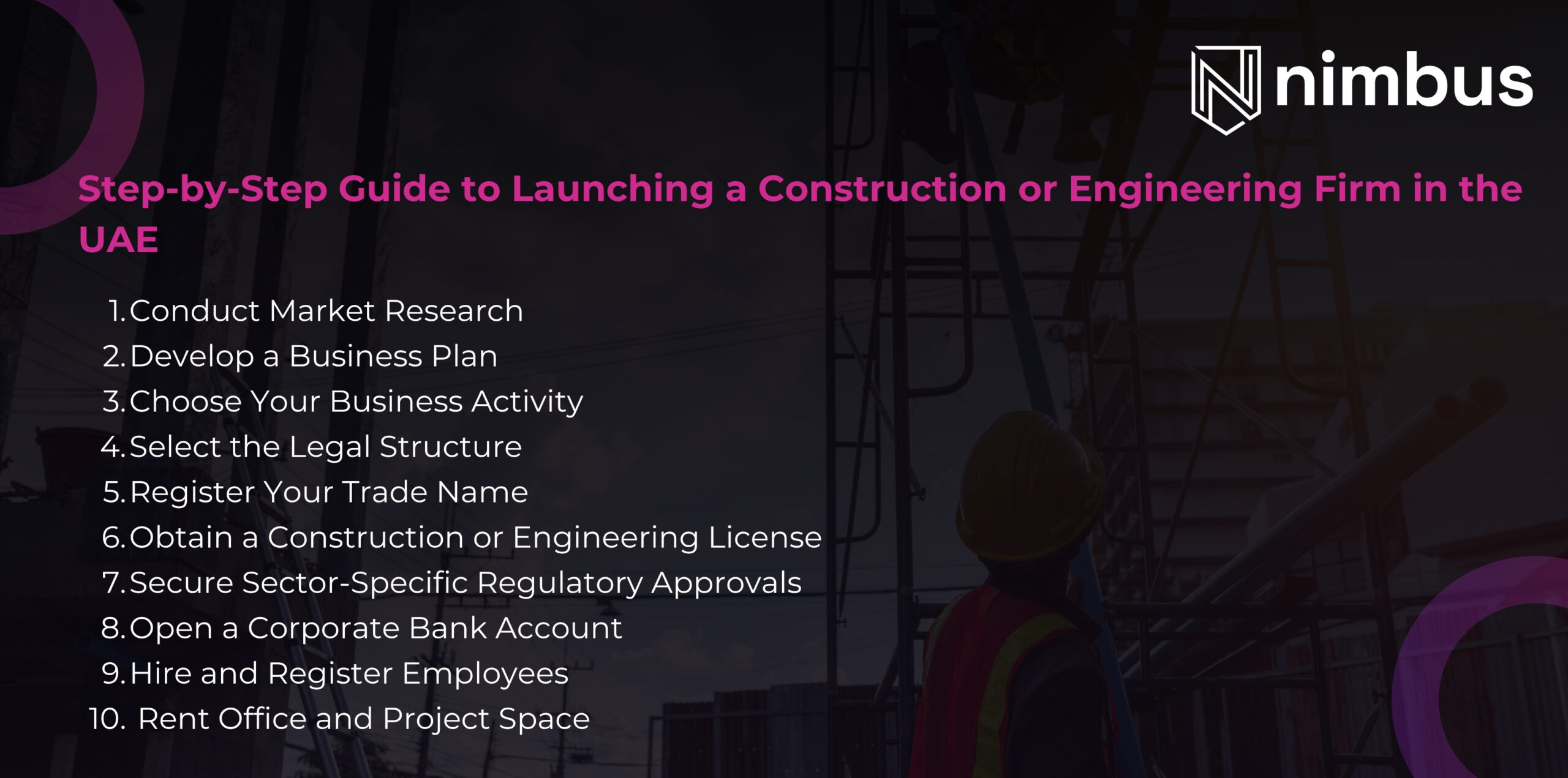The UAE’s construction sector continues to be a critical driver of the country’s economic diversification strategy. With the market valued at USD 42.75 billion in 2025 and projected to reach USD 52.66 billion by 2030, the country’s commitment to infrastructure development remains strong.
For foreign investors looking to explore business setup in the UAE, the construction and engineering sector offers tremendous opportunity, but also requires careful navigation through legal, regulatory, and operational frameworks.
This post enlists everything you need to know about setting up construction and engineering businesses in the UAE, from licensing to staffing, compliance, and strategic planning.
Starting a Construction and Engineering Company in the UAE in 2025 – An Overview

– Why the UAE Construction Sector Is Worth Your Investment?
The UAE’s strategic focus on non-oil sectors has placed construction at the heart of economic transformation. Large-scale infrastructure, tourism, logistics, and residential megaprojects continue to fuel demand.
However, the sector is not without challenges. High competition from established firms and the complexity of UAE licensing and compliance requirements mean that investors need a detailed understanding of regulatory pathways.
– Step-by-Step Guide to Launching a Construction or Engineering Firm in the UAE

1. Conduct Market Research
Start by analyzing the demand for services across sectors – residential, commercial, industrial, or infrastructure. Identify saturation points, key players, and regulatory requirements. Understanding local market dynamics will help in niche positioning and compliance planning.
2. Develop a Business Plan
A detailed business plan is essential for licensing, banking, and long-term operations. Your plan should outline business objectives, the scope of services (construction, consulting, or both), financial projections, staffing needs, and risk mitigation strategies.
3. Choose Your Business Activity
Construction and engineering services are categorized into several licensed activities:
- General construction and contracting
- Building maintenance and repairs
- Landscape design and execution
- Civil, electrical, mechanical, and architectural engineering
- Technical and project consultancy
Your selected business activity determines your licensing route and operational limitations, so choose based on your service scope and target market.
4. Select the Legal Structure
Foreign investors can typically choose between:
- Limited Liability Company (LLC): Offers liability protection and allows 100% foreign ownership in most Emirates. Ideal for those wanting full control.
- Branch Office: Allows foreign companies to operate in the UAE without a new legal entity. Requires Ministry of Economy approval and must appoint a resident general manager.
The right structure will depend on your capital investment, tax strategy, and operational model.
5. Register Your Trade Name
Choose a name that reflects your business activity and follows UAE naming guidelines. Trade name approval must be obtained before proceeding with licensing.
6. Obtain a Construction or Engineering License
Depending on your jurisdiction, you will need to apply through:
- The Department of Economic Development for mainland businesses
- A relevant Free Zone Authority (such as DMCC, Dubai South, or IFZA) if setting up within a free zone
Construction contracting companies will also need building permits before project commencement. You’ll need to submit documentation such as:
- Memorandum of Association (MOA)
- Shareholder passports and ID copies
- Company board resolutions (if applicable)
- Proof of address (Ejari or utility bill)
- Attested documents if the parent company is foreign
All documents must be translated into Arabic and legally notarized.
7. Secure Sector-Specific Regulatory Approvals
Depending on your project type, these authorities may be involved:
- Dubai Municipality: Main regulatory body for engineering and construction approvals
- Civil Defense: For fire and safety clearances
- Utility Authorities: For water and electricity permissions
- Road and Transport Authority: If road access is needed for project execution
- Telecommunications and Drainage Departments: For relevant infrastructure support
You may also require a Building Completion Certificate to confirm project compliance at closure.
8. Open a Corporate Bank Account
This is essential for receiving payments, managing cash flow, and paying suppliers. Some banks may require a physical inspection of your office before account activation. Prepare the following:
- Trade license
- MOA
- Emirates ID and passport copies
- Proof of office address
- Business plan
- Shareholder information and resolutions
9. Hire and Register Employees
You must obtain a MOHRE establishment card to begin hiring. For technical roles, staff must meet engineering certification standards. All staff must have work permits and legally compliant employment contracts. Provide:
- Health insurance
- Accommodation (for laborers)
- Proper onboarding as per UAE Labor Law
10. Rent Office and Project Space
Most licensing authorities require a physical office. For construction firms, warehousing or industrial space may also be needed. Ensure your tenancy contract is registered through Ejari in Dubai or its equivalent in other Emirates.
– Regulatory Framework for Dubai-based Companies
Construction and engineering companies in Dubai must comply with standards set by Dubai Municipality. The focus areas include:
- Licensing of companies and individuals
- Accreditation of engineers and technical managers
- Project and building permit issuance
- NOC (No Objection Certificate) approvals
- Categorization of company activities
The laws require that for every licensed activity, you have at least one qualified engineer. Labor count is determined based on project size.
– Licensing and Staff Requirements
As per Circular No. 133 of 2005, engineers must:
- Hold a relevant bachelor’s degree
- Have 5 to 10 years of experience based on the activity type
- Pass a Dubai Municipality technical exam
- Be members of the UAE Society of Engineers
– Special Requirements for Foreign Engineering Branch Offices
Foreign companies opening a branch in Dubai must:
- Appoint a general manager with 15+ years of engineering experience
- Submit a business plan to Dubai Municipality
- Employ assistant engineers with 7+ years of experience
- Ensure staff hold UAE residence visas and are registered locally
- Rent an office of at least 200 square meters
The UAE continues to attract global investors in infrastructure and real estate, making the construction and engineering sectors vibrant and full of opportunity. However, market entry requires careful planning, compliance with technical licensing, and strategic execution.
If you are considering business setup in the UAE, or looking to expand an international firm through company formation in Dubai, engaging the right experts can make all the difference.



